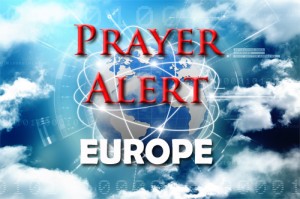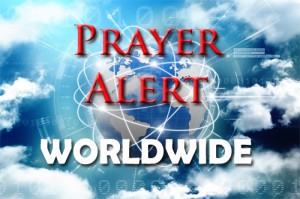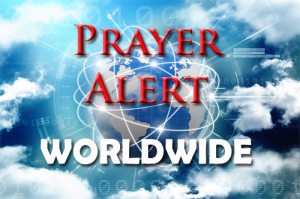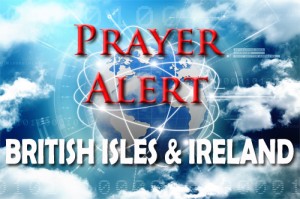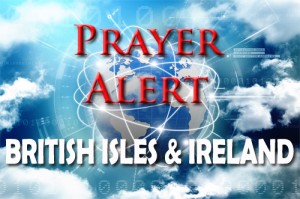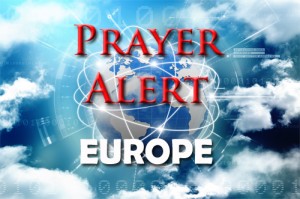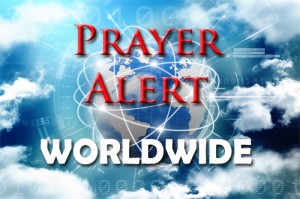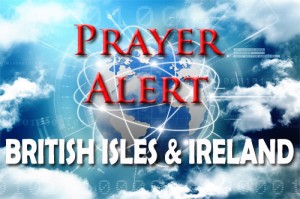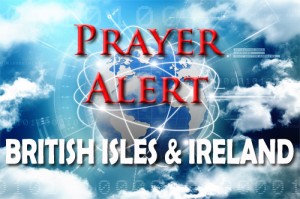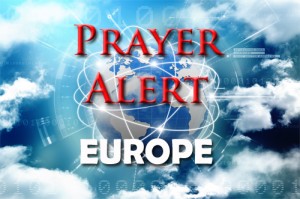Displaying items by tag: Politics
Germany’s 2017 Reformation?
31 October 2017 marks 500 years since Martin Luther rebelled against the Catholic Church with his 95 theses - the beginning of the Reformation. Today,Germany is in a tense period politically as Angela Merkel, representing the CDU/CSU ‘party-union’, negotiates a coalition agreement with the FDP and Greens to form a new federal government for the next four years. Meanwhile the political challenges from the EU need her attention. A Watchmen Team International prayer letter request is, ‘As we remember and celebrate the 500th anniversary of the Lutheran Reformation in Germany, let us continue to pray for a “new reformation” and spiritual revival in Germany and in Europe, and indeed in all our nations.’ Much has been lost in Europe and Germany because of unbelief and rejection of God. We cannot be restored by a political party or ideology: we need humble repentance before God, prayer for His solutions, and faith in His saving power. Let us station ourselves as intercessors on the ramparts like Habakkuk and trust in God’s promises.
Colombia: conflict over coca crops
Cultivation of coca, the base ingredient for cocaine, is booming in Colombia. The government tries to slash production by employing hundreds of people and police officers to destroy crops, but armed gangs and drug traffickers oppose them. People have died in recent clashes over coca; others have been injured by landmines laid to scare people away from destroying coca plants. The minister of foreign affairs blamed coca growth on the scheming of drug-trafficking gangs and peasants planting more coca to take advantage of the new substitution initiatives under the peace accords. However, the government should be offering peasant farmers better incentives to grow alternative crops. After 200 years of reforms and many billions of pesos invested, the same inequality in agriculture persists. There is a lack of political will on the part of the state to make the peasant farmers’ economy viable. See
Iran: cyberattack on UK Parliament, nuclear deal
In June, Iran was responsible for a ‘brute force’ cyberattack on Parliament lasting over twelve hours. It was initially thought that Russia was behind the attack, but intelligence officials now conclude Iran was responsible. It was Tehran's first significant cyberattack on the UK. Hackers repeatedly probed ‘weak’ passwords of politicians and aides, forcing parliamentary officials to lock MPs out of their own email accounts as they scrambled to minimise the damage. The network affected is used by every MP, including the Prime Minister and her cabinet ministers. Nine thousand email accounts were affected. The revelations come after Britain, Germany, and France tried to keep the nuclear deal with Iran, agreed in 2015, on track after President Trump’s refusal to back it. Trump stopped short of ripping up the deal, but said that it would be terminated unless measures were taken to ‘toughen it up’. He believes the international community is being ‘naïve’ in its dealings with the regime.
Proposals for new deal with the EU
In a statement to MPs, Theresa May called for a ‘unique and ambitious economic partnership’ with the EU after Brexit. ‘Progress will not always be smooth’, she said, but the UK can ‘prove the doomsayers wrong’. Following her speech in Florence, when she gave assurances on payments to the EU and citizens' rights, she said the ball is now in the EU court. Her statement came as the fifth round of negotiations began in Brussels, the final set of talks before EU leaders meet on 19 October to decide if enough progress has been made to enable them to move forward and talk about post-Brexit trade relations with the UK. Two white papers, covering future trade and customs options, are being published (see next article). Justice minister Dominic Raab said that while the UK had to ‘strive for the very best Brexit outcome’, it must also ‘prepare for all eventualities’. ‘No-deal Brexit planning is under way'.
Northern Ireland: pray for a better debate
There are reports of a change of tone between the Democratic Unionist Party (DUP) and Sinn Féin; however, at present the prospect of a Northern Ireland executive and assembly being re-established remains elusive. The secretary of state has warned that Northern Ireland is on a glide path to the British government stepping in. While ‘stepping in’ remains vague enough to hold off direct rule by British ministers for now, options are running out. Further rounds of budgets will need to be signed off, and key decisions around health, education and capital investment cannot be postponed indefinitely. It is nearly nine months since the executive was brought down.
Balkan nationalists take hope from Catalan referendum
Catalonia's drive to separate from Spain is rekindling dreams of independence in ethnic pockets across the Balkans - a dangerous ambition in a region where nationalist violence claimed tens of thousands of lives in the 1990s. Among ethnic Albanians in southern Serbia and the Serbs of Republika Srpska, in the wake of the ‘banned’ Catalan referendum, separatist leaders are asking the same question: ‘Why don't we do the same?’ On the election day, graffiti of Catalan flags appeared several towns in the Serbian province of Vojvodina, along with the claim that ‘Vojvodina = Catalonia’. Meanwhile, in the southern Bosnian town of Mostar, a giant banner appeared near the cathedral showing the flags of Catalonia and Herceg-Bosna, the self-styled Croat entity, reading ‘Good luck. We are the next.’ Local media are saying, ‘The fact that one region (Kosovo) managed to secure independence has emboldened many like-minded leaders in the region’.
Azerbaijan: a ‘democracy’ that persecutes Christians
For years, Azerbaijan has been riding the line for years between democracy and fiefdom. Its New Azerbaijan Party is accused of authoritarianism and bribery. It imprisons corruption-busting journalists and human rights advocates. Friction with neighbouring Armenia was heightened last year, with bombings and continuous calls to war. Their dispute is over Nagorno-Karabakh, an Armenian enclave within Azeri territory. Oil export revenues have aided the Azeri population, elevating living standards and increasing military strength; but poverty and corruption plague the nation. Although Azerbaijan fell off the 2017 World Watch List of persecuted Christians, that is not because restrictions have eased. Christian detentions continue; they face harassment and intimidation, and many are given large fines for meeting as churches or giving out Bibles. Only 0.22% of the people are evangelical Christians. Azerbaijan was one of the first republics in the Soviet Union to face the problem of refugees. There are 618,137 refugees and internally displaced persons in the country.
Scotland bans fracking
A decision by the Scottish government to ban fracking has been welcomed by the Church of Scotland. Church leaders said the vast majority of congregations oppose this controversial practice. They have now called for more opportunities to exploit greener energy sources, like wind. Adrian Shaw, the Church of Scotland's climate change officer said the Church is against fracking ‘primarily because of a need to build a low carbon economy’, adding, ‘Continuing dependence on fossil fuels, coal, and gas delays a low-carbon economy.’ He also said that the Church believes in the potential for Scotland to be fully green. ‘Our resources for wind power, hydropower, and tidal power are enormous here.’
Intercessor Focus: Brexit issues
On 22 September Theresa May gave the EU the UK's strategy for Brexit, but by the end of the fourth round of Brexit talks a week later there was little sign of compromise on either side. Pray for agreement on broad-minded non-disruptive changeover arrangements which will benefit both the EU and the UK. The Prime Minister said a transition period could be around two years, during which time access to the single market would continue on current terms. Pray for negotiators to move forward positively and speedily to construct workable EU-UK relationships during and after Brexit. She also proposed a ‘bold new security agreement’ between the UK and the EU. Pray for a withdrawal that continues to honour the peace process in Ireland and avoids a hard border. On trade, the PM said there was no need to impose tariffs where there are none now. Pray for a transition that doesn’t adopt existing models, but rather provides better stability for businesses and workers.
Germany: influence of AfD
Alternative for Germany (AfD), founded in 2013, is a right-wing populist and Eurosceptic political party. In 2016 it made an alliance with the Freedom Party of Austria, with both party leaders saying border control officers should use armed force if necessary to protect the border. By May 2017, the AfD had gained representation in 13 of the 16 German state parliaments. Now it has become the third largest party in the German parliament, partly because immigration was the main election issue. Postwar Germany is multicultural, tolerant and liberal: abhorring war, and defending the environment, human rights and international teamwork. BUT the influx of over one million Muslim migrants, Russia’s dramatic resurgence, and Europe’s rolling financial problems are arousing other feelings and aspirations. These emotions don’t square with the desire to be tolerant and multicultural. Many are saying that a more powerful, more assertive, more terrifying Germany is coming.
